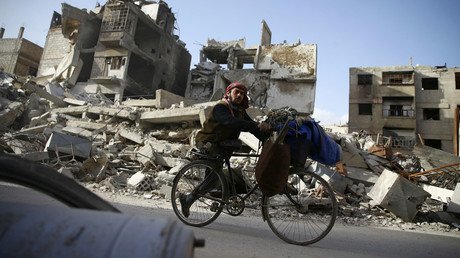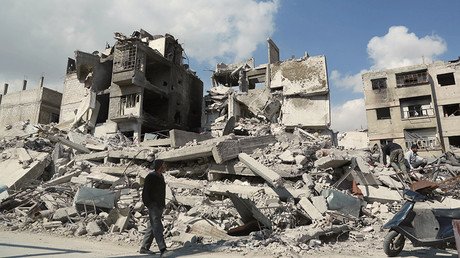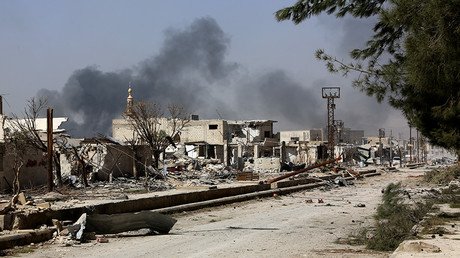First group of militants surrender arms & leave East Ghouta after Russia-brokered talks
The first group of militants have surrendered their arms and left East Ghouta as an increasing number of rebel fighters in Syria seek to disassociate themselves from Jabhat al-Nusra terrorists, the Russian military has announced.
“Certain representatives of illegal armed groups have intensified attempts to get in touch with the Syrian government forces and the Russian Center for Reconciliation with the aim of discussing their separation from the banned terrorist group Jabhat al-Nusra,” Major General Yury Yevtushenko, the head of the Reconciliation Center in Syria, said in a statement on Friday.
Efforts to separate the so-called moderate opposition fighters from jihadists continue in the Damascus suburb of Eastern Ghouta. The Syrian government established a humanitarian corridor which remains open to both civilians and militants who are willing to lay down their arms.
The first group of 13 militants used the gateway to leave the rebel-controlled Damascus suburb via Muhayam al-Wafideen corridor overnight. Video of the exodus under government watch shows fighters carrying their belongings and boarding vehicles to head to Idlib. Yevtushenko attributed the militant surrender to the “lengthy talks” held by the reconciliation center’s officers and jihadist groups.
No provocations followed the exit of militants, the general said, adding that those who have surrendered will be transported to Idlib, while negotiations continue regarding the surrender of other militants. The news of militants’ surrender coincided with a statement by the Jaysh Al-Islam group, which allegedly agreed to release Tahrir al-Sham (HTS) fighters from their prisons and send them towards Idlib as well.
The situation in East Ghouta remains tense, Yevtushenko said, stressing that terrorists continue shelling civilian areas of Damascus and targeting those who are trying to flee the terrorist enclave. “The attacks are carried out even during the humanitarian pauses,” the general said, noting that none of the civilians managed to safely exit the terrorist-controlled areas in the past day.
The situation is getting so dire that people are prepared to flee by bypassing the corridors which are targeted by the militants, Yevtushenko said, citing reports received through the Russian Centre’s hotline.
Despite tensions in East Ghouta, the Russian Centre for Reconciliation has ensured “safe and unimpeded delivery” of the United Nations-Syrian Arab Red Crescent humanitarian convoy on Friday. The convoy of 13 trucks delivered 74 tons of food and medical supplies to East Ghouta’s Douma, which lies just 10 km north-east of the center of Damascus.
“Teams from ICRC, Syrian Arab Red Crescent (SARC) and UN in Eastern Ghouta delivered 2,400 food parcels that can sustain 12,000 people for one month, as well as 3,248 wheat flour bags,” the aid agency told RT in a statement. “The 13-truck delivery was part of a convoy that could not be fully unloaded on 5 March due to the security situation.”
“The needs of people remains massive,” Ralph El Hage, a representative from the Red Cross told RT. "You have medical needs, you need access to a good source of food, you also need to have access to clean water.”
Currently, the priority remains the delivery of medical supplies and food aid to the militant-controlled areas. SARC is currently waiting for “security guarantees” from the warring sides to deliver more supplies to the civilian population, El Hage added.
#Now :@SYRedCrescent teams in cooperation with @ICRC and @UN enter #Eastern_Ghouta on Friday, March 9, 2018. They will carry out a delivery of a remaining of aid that wasn't offloaded during the previous convoy on 5th March. The #convoy carries 2400 food parcels, 3240 flour bags pic.twitter.com/DOTVItM4DQ
— Syrian Red Crescent (@SYRedCrescent) March 9, 2018
A Russia-backed ceasefire came into effect in Syria’s Eastern Ghouta late last month, following the UN Security Council resolution which called for a 30-day ceasefire across Syria. It envisions mutually agreed humanitarian pauses for aid deliveries and evacuation of civilians, through the specially established humanitarian corridor. However, the militants ignored the agreement and continue shelling Damascus and firing at those trying to leave the area even during those pauses. An estimated 400,000 people remain trapped in besieged Eastern Ghouta since 2013.
Like this story? Share it with a friend!















